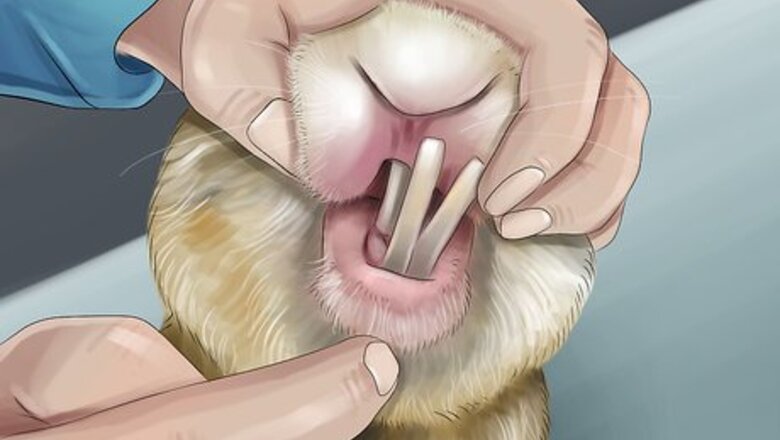
views
Seeking Veterinary Care
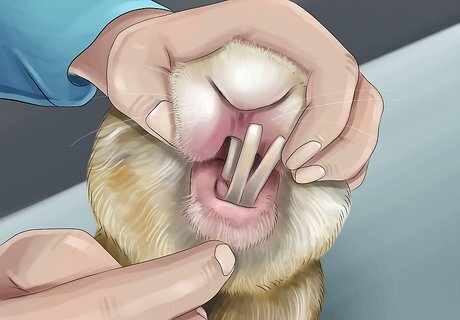
Watch for signs of overgrown teeth. The most obvious sign of overgrown teeth will be that your rabbit's teeth are longer and more tusk-like than usual. However, overgrown teeth may also be marked by symptoms like drooling, a decrease in grooming, and a loss of appetite.
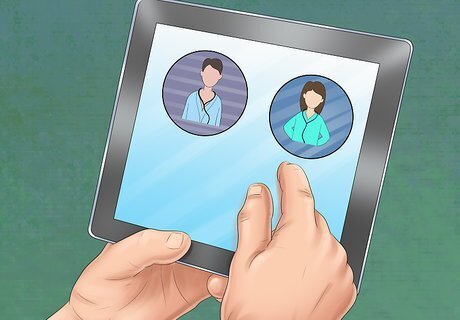
Find a vet who can treat rabbits. Not every vet is experienced with treating rabbits. If you don't have an existing vet already, look online to find vets that treat rabbits in your area. You can also call various veterinary clinics and ask if the vets treat rabbits.
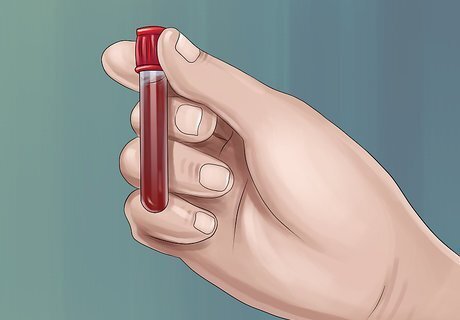
Have your vet perform a complete exam. Once at the vet's office, your vet will examine your rabbit, paying close attention to their teeth. The exam will help your vet evaluate the best method to treat overgrown teeth. It will also help the vet figure out if the overgrown teeth have caused any complications. Usually, the exam will only be physical. However, if your vet suspects complications like an infection, blood work may be necessary. Extremely overgrown teeth may require x-rays.
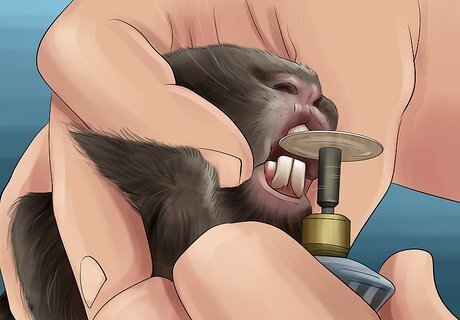
Let your vet trim your rabbit's teeth. Overgrown teeth can usually be trimmed with a file or a small rotary tool. This is usually a fairly simple procedure that can quickly and safely remove overgrown teeth. You'll be able to take your rabbit home on the same day the teeth are trimmed. Never attempt to trim your rabbit's teeth on your own. Special veterinary equipment is necessary to prevent fractures. It’s especially important not to try to trim the teeth with nail clippers or wire trimmers, which can exert too much pressure and even shatter the teeth.
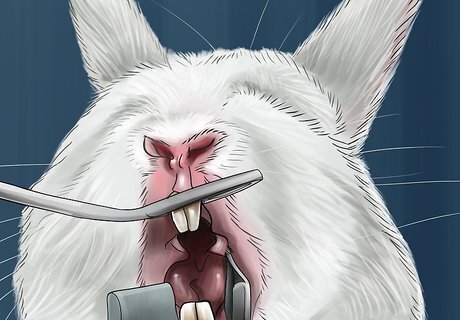
Have surgery in extreme cases. Surgery is rarely necessary to treat overgrown teeth, but may be necessary if overgrown teeth are caused by congenital problems or trauma to the mouth. Your vet may need to surgically remove or adjust your rabbit's teeth. This procedure is more expensive and your rabbit may need to stay at the vets for a few days after the procedure. Talk over the process of surgery carefully with your vet. Make sure you understand what your rabbit will need before and after surgery. Depending on your rabbit's age and overall health, things like blood work may be necessary prior to surgery.
Treating Your Rabbit at Home
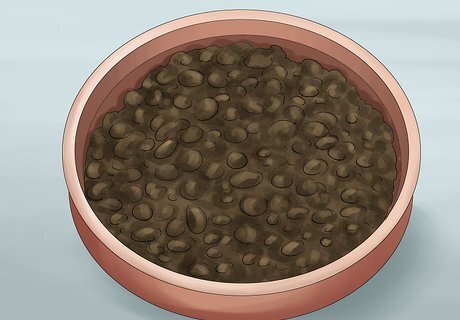
Soften pellets with water. Your rabbit's teeth may be sore after being treated by a vet, especially if they were treated surgically. Rabbits may struggle to eat their regular food for a few days after treatment, so it can help to soften their pellets with water. Don't panic if your rabbit eats less or doesn't eat at all for a day or so after treatment. Stress and pain can decrease a rabbit's appetite, but most rabbits will return to regular eating habits within a few days of treatment.
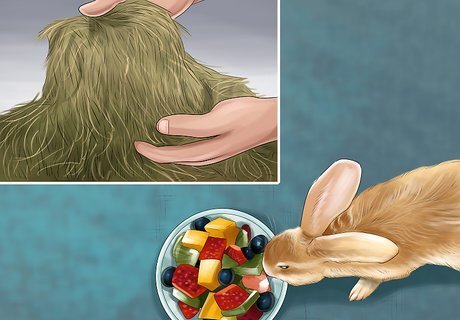
Tear up your rabbit's fruit, veggies, and hay. Your rabbit's teeth will be sore after treatment, so providing food in smaller sizes will help your rabbit eat. Cut fruits and vegetables into tiny portions. If you give your rabbit hay, break the hay into three or four inch sections.
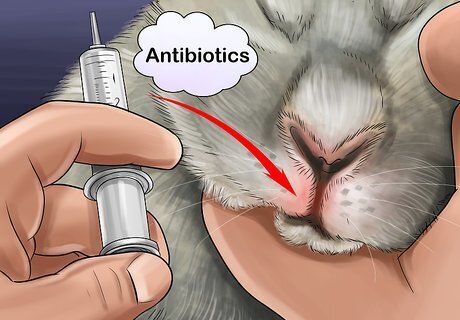
Administer any prescribed antibiotics. If your vet prescribed antibiotics after treatment, make sure to give your rabbit the full round of its medication. Antibiotics may be broken up and placed in a rabbit's food or administered via a syringe. Your vet should let you know how to administer meds as well as the proper dosage. Ask your vet about any complications or side effects to watch for. If you have any questions about the medication when you get home, contact your vet as soon as possible.
Preventing a Reoccurrence
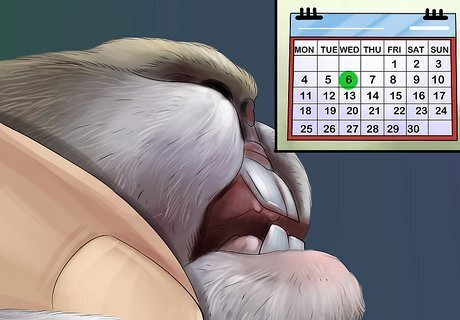
Inspect your rabbit's teeth regularly. The quicker you treat overgrown teeth, the better. Check your rabbit’s teeth once a week and be on the lookout for teeth that are growing quickly or growing in crooked. In addition to checking your rabbit's teeth yourself, have your vet perform a dental exam during every visit and annual checkup..
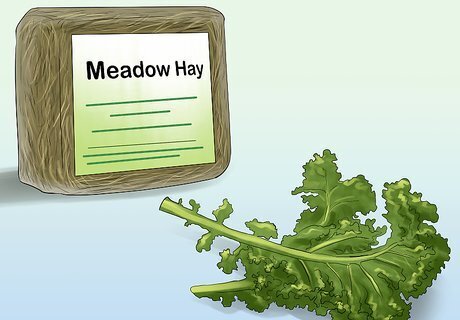
Feed your rabbit fibrous foods. A diet high in fibrous food will help your rabbit wear down their teeth, preventing them from becoming overgrown. In addition to pellets, supplement your rabbit's diet with grass, leafy vegetables like kale, and fibrous, abrasive hay fresh from the meadow. You want your rabbit’s diet to resemble what rabbits eat naturally in the wild. Eating balanced food with the proper amounts and ratios of nutrients will make your rabbit’s teeth healthy and strong.
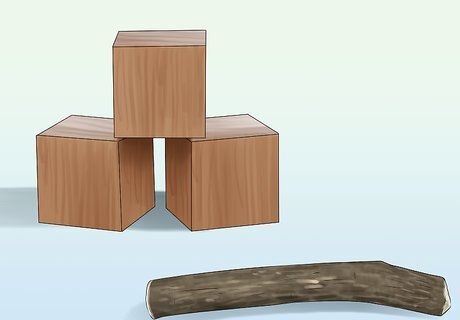
Provide your rabbit with plenty of objects to chew. Chewing is essential to a rabbit's health, so stock their cage with items they can gnaw on. Blocks of wood that have not been painted, varnished, or otherwise chemically treated are a great option. Pet stores carry treats, such as log treats, that are meant to be chewed over time. Make sure to throw away the toy when it gets too small so that your rabbit doesn’t choke on it. Rabbits have different preferences in terms of objects they like to chew. You may have to do some trial and error to find an object your rabbit will like. Do not give your rabbit any harmful items to chew. Make sure they are non-toxic, natural, and designed for chewing.
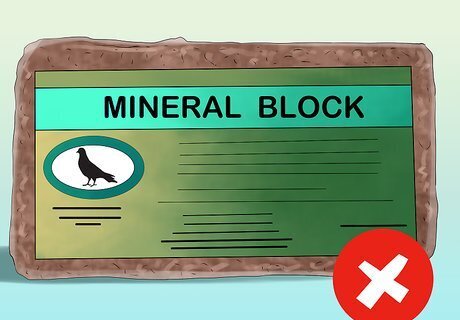
Do not give your rabbit mineral supplement blocks. Mineral supplement blocks are not necessary to your rabbit's diet if you're providing them with pellets. They do not actually prevent overgrown teeth and can cause health problems for some rabbits.













Comments
0 comment